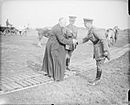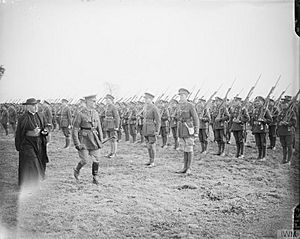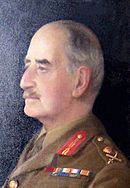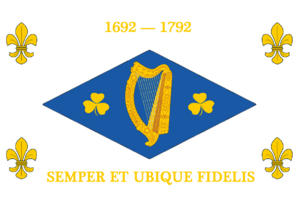William Hickie facts for kids
Quick facts for kids
Sir William Hickie
|
|
|---|---|
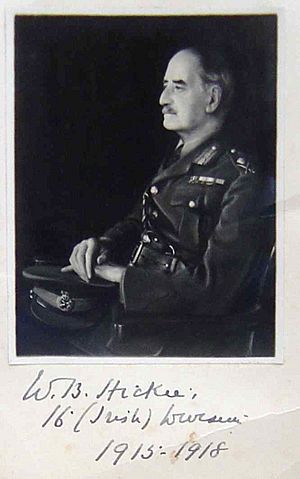
Major General Sir William Hickie, KCB
|
|
| Born | 21 May 1865 Terryglass, Borrisokane, County Tipperary, Ireland |
| Died | 3 November 1950 (aged 85) Dublin, County Dublin, Republic of Ireland |
| Buried |
Terryglass, County Tipperary
|
| Allegiance | United Kingdom |
| Service/ |
British Army |
| Years of service | 1885–1922 |
| Rank | Major General |
| Unit | Royal Fusiliers |
| Commands held | 16th (Irish) Division 53rd Brigade 13th Brigade |
| Battles/wars | Second Boer War
|
| Awards | Knight Commander of the Order of the Bath |
| Relations | Colonel James Francis Hickie (father) |
| Other work | Seanad of the Irish Free State |
Major General Sir William Bernard Hickie (born May 21, 1865 – died November 3, 1950) was an important British Army officer from Ireland. He was also an Irish nationalist politician. He fought in major wars and later helped shape the new Irish Free State.
Hickie served in the Second Boer War from 1899 to 1902. He was a key officer in Ireland before the First World War. During World War I (1914-1918), he led a brigade and later the 16th (Irish) Division. This division fought bravely on the Western Front.
Contents
Early Life and Family
William Hickie was born on May 21, 1865. His birthplace was Slevoir, near Borrisokane, in County Tipperary, Ireland. He was the oldest of eight children. His father, James Francis Hickie, was also a Colonel in the army. William came from a long line of soldiers. His family was known for its strong Irish roots. Two of his four brothers also joined the army. William went to St Mary's College, Oscott in England. This school was well-known for educating young men from wealthy Catholic families.
Becoming a Soldier
William Hickie trained at the Royal Military College, Sandhurst. He was there from 1882 to 1885. In 1885, he joined his father's regiment, the Royal Fusiliers. He served with them for 13 years. During this time, he was stationed in places like the Mediterranean, Egypt, and India. He became a captain in 1892.
In 1899, he finished training at the Staff College, Camberley. When the Second Boer War started, he was chosen for special duties. He went to South Africa in early 1900. He quickly moved up in rank, becoming a major in March 1900. He commanded his own group of soldiers for 18 months. He fought well at the Battle of Bothaville in November 1900. For his bravery, he was promoted to lieutenant colonel. He stayed in South Africa until the war ended in June 1902.
Service in Ireland
After the Boer War, Hickie held several important roles. From 1902, he worked in the Cork district in Ireland. In 1907, he returned to his regiment in Dublin and Mullingar. He commanded the 1st Royal Fusiliers for two years. From 1909 to 1912, he was part of the staff for the 8th Infantry Division in Cork. He was well-known for his love of hunting and polo. In May 1912, he became a colonel. He then became the Quartermaster General for the Irish Command. This role earned him the award of Companion of the Order of the Bath.
World War I Service
When World War I began in August 1914, Hickie was promoted to brigadier general. He joined the British Expeditionary Force in France. He helped manage supplies and soldiers during the retreat after the Battle of Mons. He also served during the First Battle of the Marne. In September 1914, he took command of the 13th Brigade. Later, he led the 53rd Brigade until December 1915. He was then called back to England to lead the 16th (Irish) Division.
Hickie became a major-general and took over the 16th (Irish) Division. This was a very important job. He was an Irish Catholic officer, which was rare at that high level. The division was made up of Irish volunteers. Hickie was very good at handling the political side of his role. He spoke of his pride in leading the division. He also made some big changes to the division's leadership. After intense training, the division went to France in December 1915.
Key Battles and Achievements
For over two years, Hickie commanded the 16th (Irish) Division. It became known for its strong attacks and bravery. The division earned many honors for its courage. They fought in major battles like:
- The 1916 Battle of Guillemont
- The capture of Ginchy (both part of the Battle of the Somme)
- The Battle of Messines
- The Third Battle of Ypres (in terrible conditions)
- Attacks near Bullecourt during the Battle of Cambrai in November 1917
The division improved its fighting methods during this time. However, they also suffered many losses. It became hard to find new Irish recruits. This was because many Irish people were losing faith in the war. Also, Ireland did not have forced military service. Hickie solved this problem by bringing non-Irish soldiers into the division.
In February 1918, Hickie went home due to illness. While he was in the hospital, Germany launched a huge attack. His division was almost completely destroyed. Although he was promised a new command, the war ended before he could get one. Hickie was known as one of the army's best commanders. He was smart and skilled. He helped the British army improve its tactics from 1916 to 1917. In 1918, he was awarded the Knight Commander of the Order of the Bath.
Life After the Army
Hickie left the army in 1922. At this time, many Irish army regiments were disbanded. He strongly supported the idea of Home Rule for Ireland. He believed that stopping it was a disaster. He also spoke out against the actions of the "Black and Tans."
In 1925, he was elected to the Irish Senate. This was called the Seanad of the Irish Free State. He received many votes and was one of the first members elected. Hickie served in the Senate until it was dissolved in 1936. He also led the Southern Ireland branch of the Royal British Legion from 1925 to 1948. William Hickie never married.
He passed away on November 3, 1950, in Dublin. He was buried in his hometown of Terryglass, County Tipperary.
 | Misty Copeland |
 | Raven Wilkinson |
 | Debra Austin |
 | Aesha Ash |


